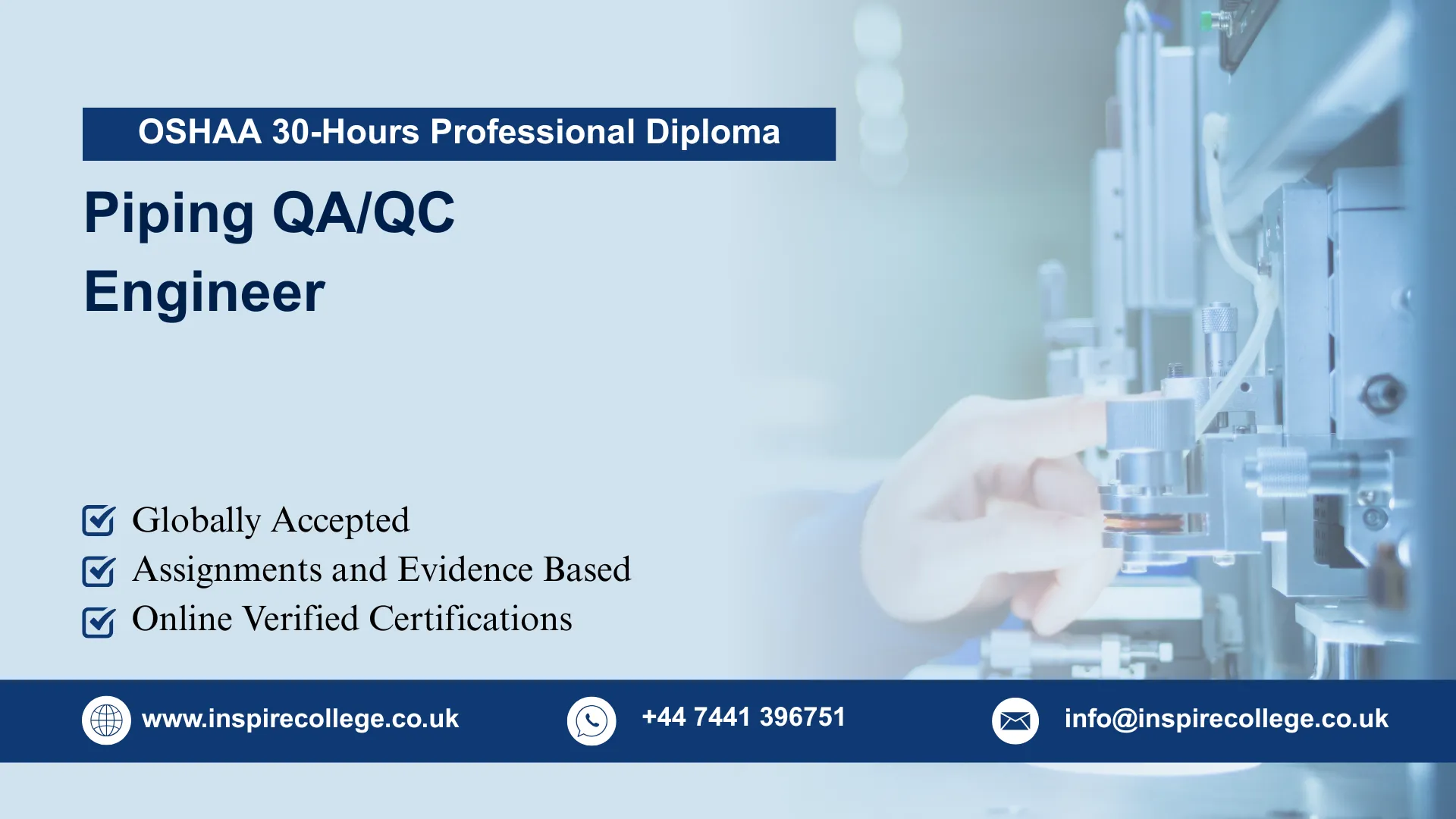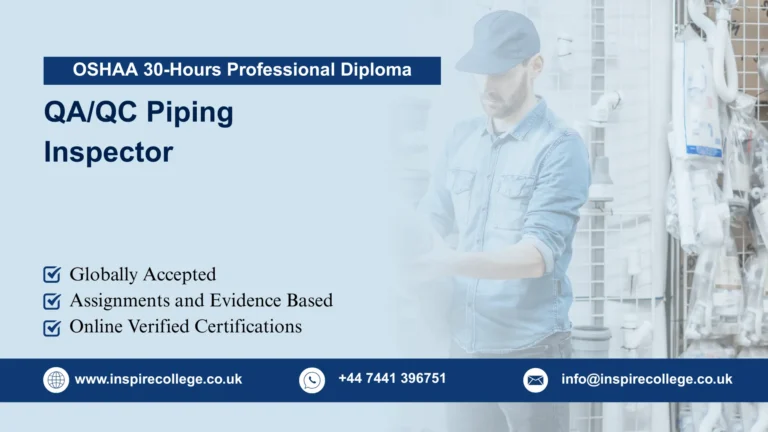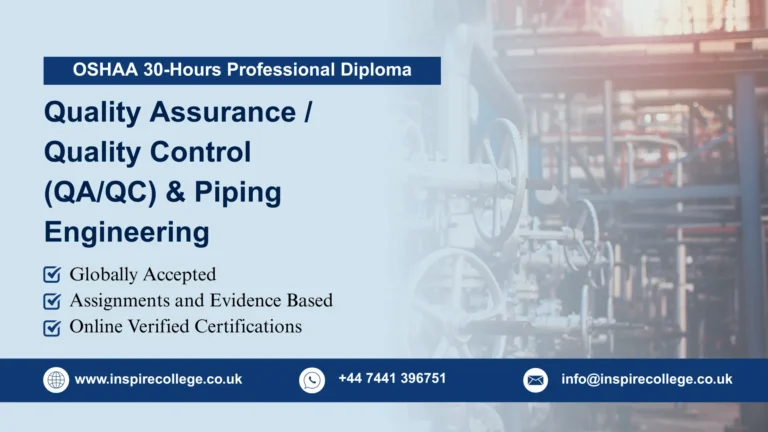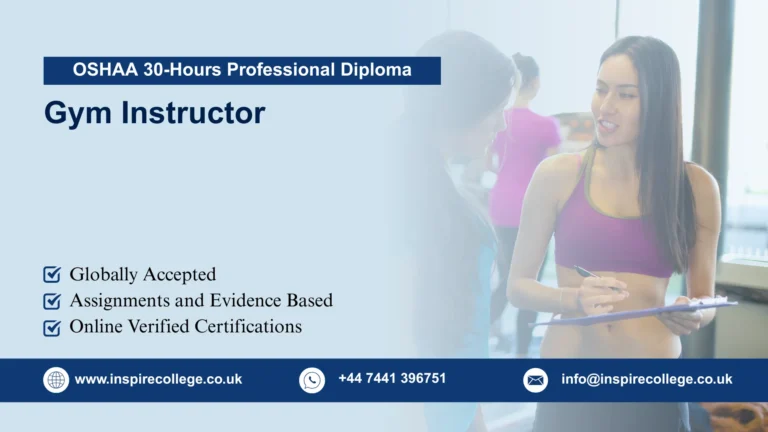
OSHAA 30-Hours Professional Diploma in Piping QA/QC Engineer
In modern industrial and construction sectors, the quality, safety, and integrity of piping systems are critical to project success, regulatory compliance, and operational efficiency. The OSHAA 30-Hours Professional Diploma in Piping QA/QC Engineer is a comprehensive program designed to equip professionals with the technical expertise, practical skills, and industry knowledge required to ensure high-quality standards in piping projects.
OSHAA 30-Hours Professional Diploma in Piping QA/QC Engineer covers essential topics such as QA/QC principles in piping engineering, piping materials and components, welding technology and procedure qualification, international standards and codes (ASME, API, ISO), non-destructive testing (NDT) methods, interpretation of piping isometrics and layout drawings, inspection and test plans (ITPs), identification and evaluation of piping defects, and quality documentation including WPS, PQR, and NDT reports. Participants will gain hands-on experience in applying these skills to real-world scenarios, preparing them to manage project quality effectively and ensure compliance with international best practices.
By completing OSHAA 30-Hours Professional Diploma in Piping QA/QC Engineer, learners will develop the ability to interpret engineering drawings, conduct inspections, implement QA/QC procedures, identify and mitigate defects, and manage comprehensive quality documentation. Emphasis is placed on practical applications, enabling participants to contribute effectively to safe, reliable, and high-quality piping projects across industries such as oil and gas, petrochemical, power generation, construction, and manufacturing.
The OSHAA 30-Hours Professional Diploma in Piping QA/QC Engineer is ideal for QA/QC engineers, piping inspectors, project engineers, site supervisors, and other professionals seeking to advance their technical competence, practical skills, and career prospects in industrial QA/QC and piping engineering.
To ensure participants gain maximum benefit from this professional program, applicants should meet the following criteria:
- Age Requirement
- Applicants must be at least 18 years old to ensure professional maturity and readiness for industrial training and QA/QC responsibilities.
- Educational Requirements
- Minimum: High school diploma or equivalent.
- Preferred: Degree or diploma in mechanical engineering, piping engineering, welding technology, metallurgy, or related technical fields.
- Candidates with prior QA/QC certifications or industrial training are highly recommended.
- Professional Experience
- Previous experience in QA/QC, piping fabrication, welding, or industrial inspection is advantageous.
- Suitable for QA/QC engineers, piping inspectors, project engineers, site supervisors, and professionals managing piping projects.
- Technical Skills
- Basic knowledge of piping systems, welding processes, and fabrication practices.
- Ability to read and interpret engineering drawings, piping isometrics, and layout diagrams.
- Familiarity with QA/QC documentation, including Welding Procedure Specifications (WPS), Procedure Qualification Records (PQR), and NDT reports.
- Motivation and Commitment
- Demonstrated interest in QA/QC practices, piping inspection, and quality assurance.
- Commitment to complete 30 hours of structured learning, including practical and theoretical sessions.
- Dedication to applying learned skills in real-world industrial projects.
- English Language Proficiency
- Competence in written and spoken English to understand technical documentation, international codes, and safety regulations.
- Ability to communicate effectively in industrial and professional environments.
- Related Course Recommendation
- OSHAA 30-Hours Professional Diploma in QA/QC Piping and Welding Engineering: Offers advanced insight into QA/QC practices, welding technologies, defect detection, and industrial piping inspection techniques.
Mandatory Units
The OSHAA 30-Hours Professional Diploma in Piping QA/QC Engineer, to achieve the qualification candidates must complete all the mandatory units form the following :
Mandatory Units
- Introduction to Piping QA/QC Engineering
- Piping Materials, Components, and Fabrication Methods
- International Codes and Standards: ASME, API, ISO
- Welding Processes and Procedure Qualification
- Non-Destructive Testing (NDT) Techniques and Applications
- Piping Isometrics and Technical Drawing Interpretation
- Inspection and Test Plans (ITPs) in Piping Projects
- Identification of Fabrication Defects and Site Quality Issues
- QA/QC Documentation: WPS, PQR, NDT Reports, and Records
Hours Professional Diploma in Piping QA/QC Engineer equips learners with the technical knowledge, practical skills, and professional competence required to ensure high-quality standards, safety, and compliance in industrial piping projects. Graduates of this program will gain the ability to manage QA/QC processes, interpret engineering drawings, and implement inspection and testing procedures in accordance
1. Introduction to Piping QA/QC Engineering
- Understand the role and responsibilities of QA/QC engineers in piping projects.
- Comprehend the significance of quality assurance and control in ensuring project safety and efficiency.
- Apply QA/QC principles in practical scenarios to improve project outcomes.
- Develop effective communication skills for coordination with project teams.
2. Piping Materials, Components, and Fabrication Methods
- Identify commonly used piping materials and components and their industrial applications.
- Understand fabrication techniques including cutting, welding, and assembly of piping systems.
- Evaluate material suitability and compliance with project specifications.
- Apply knowledge to inspect and verify the quality of fabricated piping components.
3. International Codes and Standards: ASME, API, ISO
- Interpret and apply key international codes and standards relevant to piping QA/QC.
- Ensure compliance with ASME, API, and ISO standards in project execution.
- Integrate standards into inspection, reporting, and corrective action processes.
4. Welding Processes and Procedure Qualification
- Understand welding processes, techniques, and equipment used in piping fabrication.
- Conduct procedure qualification and assess weld quality in line with project requirements.
- Identify welding defects and recommend corrective measures.
5. Non-Destructive Testing (NDT) Techniques and Applications
- Gain knowledge of NDT methods such as ultrasonic, radiographic, magnetic particle, and dye penetrant testing.
- Apply NDT techniques to detect defects in piping systems and welds.
- Interpret results accurately to ensure compliance with QA/QC standards.
6. Piping Isometrics and Technical Drawing Interpretation
- Read and interpret piping isometrics, layouts, and technical drawings accurately.
- Apply drawing interpretation skills to plan inspections and verify installations.
- Ensure components and systems conform to design specifications.
7. Inspection and Test Plans (ITPs) in Piping Projects
- Develop and implement Inspection and Test Plans (ITPs) for various project stages.
- Monitor fabrication and erection processes to ensure quality and compliance.
- Identify deviations and recommend corrective actions effectively.
8. Identification of Fabrication Defects and Site Quality Issues
- Detect and classify common piping and welding defects.
- Evaluate defect severity and impact on system integrity and safety.
- Apply preventive and corrective measures to maintain project quality.
9. QA/QC Documentation: WPS, PQR, NDT Reports, and Records
- Prepare, review, and manage quality documentation including WPS, PQR, and NDT reports.
- Maintain accurate records for inspections, tests, and compliance audits.
- Use documentation to support decision-making and regulatory adherence.
The OSHAA 30-Hours Professional Diploma in Piping QA/QC Engineer is designed for professionals who aspire to advance their technical expertise, practical inspection skills, and career prospects in industrial piping projects. This diploma is ideal for learners seeking to ensure compliance, safety, and high-quality standards in piping and welding operations across various industrial sectors.
This program is particularly suited for:
- QA/QC engineers responsible for maintaining quality standards in piping and welding projects.
- Piping inspectors conducting fabrication, erection, and site inspections.
- Project engineers, site supervisors, and construction managers overseeing QA/QC procedures and compliance.
- Professionals working in industries such as oil and gas, petrochemical, power generation, construction, and manufacturing.
- Graduates and professionals from mechanical engineering, welding technology, metallurgy, or related technical fields who want specialized QA/QC expertise.
- Individuals aiming to gain practical skills in defect detection, inspection procedures, NDT techniques, and quality documentation management.
- Professionals seeking to understand and apply international codes and standards, including ASME, API, and ISO, in real-world projects.
- Learners committed to Continuing Professional Development (CPD) and career growth in industrial QA/QC and piping engineering roles.
- Participants who want to confidently manage Inspection and Test Plans (ITPs) and ensure project quality and regulatory compliance.
By completing this diploma, learners will acquire the competence, confidence, and practical experience necessary to perform QA/QC inspections, interpret engineering drawings, manage documentation such as WPS, PQR, and NDT reports, and contribute to safe, reliable, and high-quality piping projects globally.
Register Now
OSHAA 30-Hours Professional Diploma in Piping QA/QC Engineer






